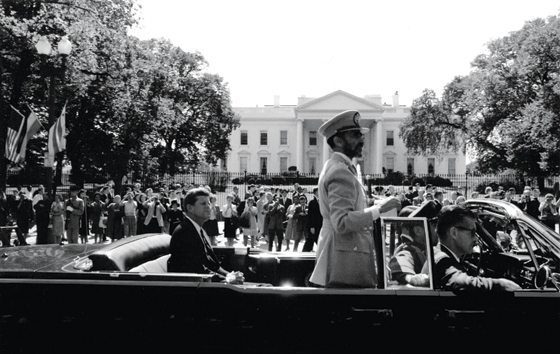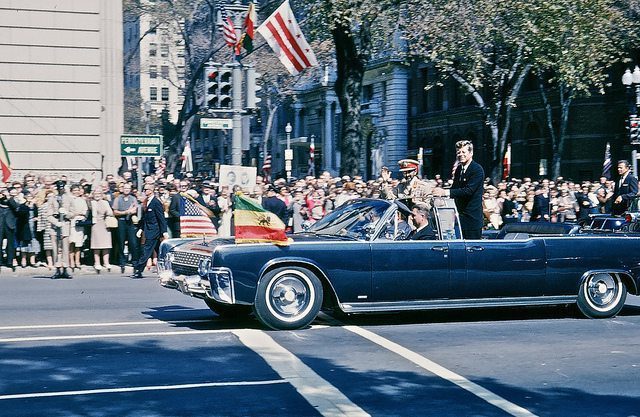H.I.M meets JFK in 1963
Until the philosophy that holds one race superior and another inferior Is finally and permanently discredited and abandoned, everywhere is War.”
These lyrics, from the Bob Marley song ‘War’, were originally found in an English translation of the speech Emperor Haile Selassie of Ethiopia delivered to the United Nations in New York in October 1963.
It was the Emperor’s second visit to America. He had previously visited US President Dwight Eisenhower in 1954. Eisenhower later told reporters that Selassie had taught him something he should have already known. What was this warning?
In 1960, as he left office, Eisenhower warned that a permanent armaments industry had grown in America: “In the councils of government, we must guard against the acquisition of unwarranted influence, whether sought or unsought, by the military-industrial complex. The potential for the disastrous rise of misplaced power exists and will persist.”
When John F Kennedy followed Eisenhower as President of the United States, he knew he had enemies in the military. First, he had refused to back a Cuban invasion in 1962, and was stalling on a military escalation in Vietnam. Kennedy was gung-ho in many ways, but he seemed to be interested in peace, and wanted to head off the “misplaced power” of the military.

In this picture, we see Emperor Selassie and President John F. Kennedy riding through Washington D.C. in the presidential limousine on 1 October 1963. Emperor Selassie told the press that his main reason for visiting the United States was the opportunity to meet with the young American president, and to discuss problems of mutual concern. John F. Kennedy was in awe of the Emperor, who was regarded as one of the world’s great statesmen. Welcoming the Emperor, John F. Kennedy said:
“Most of all, we are glad to have you here because of your own extraordinary record. Those of us who have held office for a comparatively brief time are somewhat awed to realize that you have borne the responsibility of leadership in your country for more than 45 years. For a good part of this century, with all the changes that it has brought to not only your own country but to the continent of Africa, and so much of the West during this whole period, the central thrust of burden has been borne by you.”
The Emperor stayed in the White House during his short visit to Washington, before going on to New York. The dates are highly significant. It is likely that Emperor Selassie encouraged the young President to heed the message of his forthcoming speech at the United Nations, about universal human rights, and the danger of perpetual war. Kennedy knew well that in America, the richest country in the world, there were “first and second class citizens,” and a “philosophy that holds one race superior and another inferior.”

On October 2, 1963, John F. Kennedy met with Secretary of Defence Robert McNamara and General Maxwell Taylor, who had just returned from Vietnam. That evening, the White House announced that it would begin withdrawing military advisors from Vietnam.
On October 3, Emperor Selassie left Washington D.C. for New York City, and on October 4, 1963, the Emperor delivered his ‘War’ speech to the assembly conference, speaking in the ancient Ethiopian language of Amharic.
On October 5, 1963, JFK announced his formal decision to withdraw from Vietnam, beginning with a withdrawal of 1,000 of the 16,000 so-called ‘military advisors’. Historians disagree about JFK’s true intentions about Vietnam. Yet the historical record shows that he first announced the decision to end the conflict while Emperor Selassie was present in the White House. The Emperor and the American president were sending the world a sign of solidarity.
President John F. Kennedy was murdered six weeks later in Dallas, Texas.
Source: IrieUP




